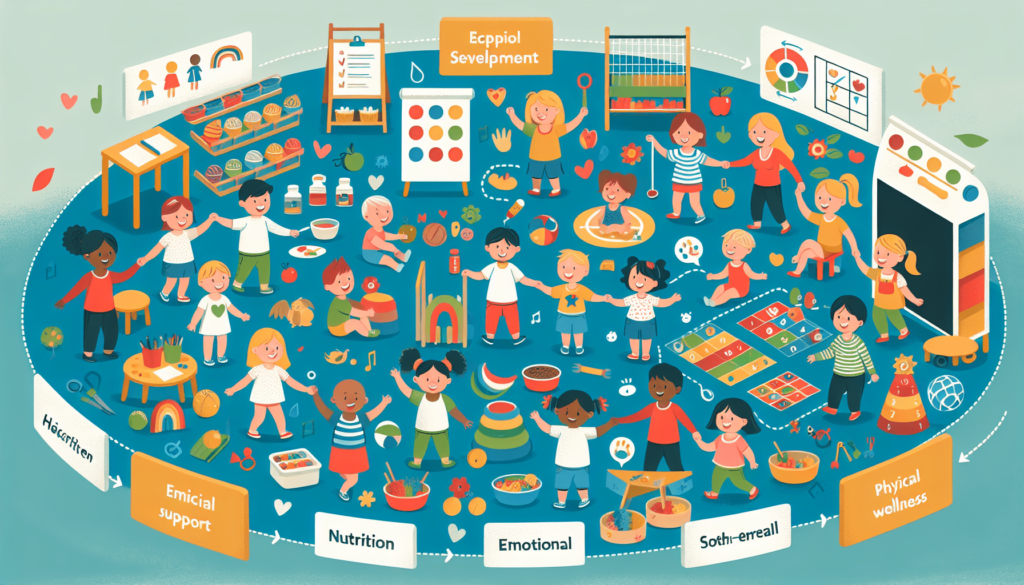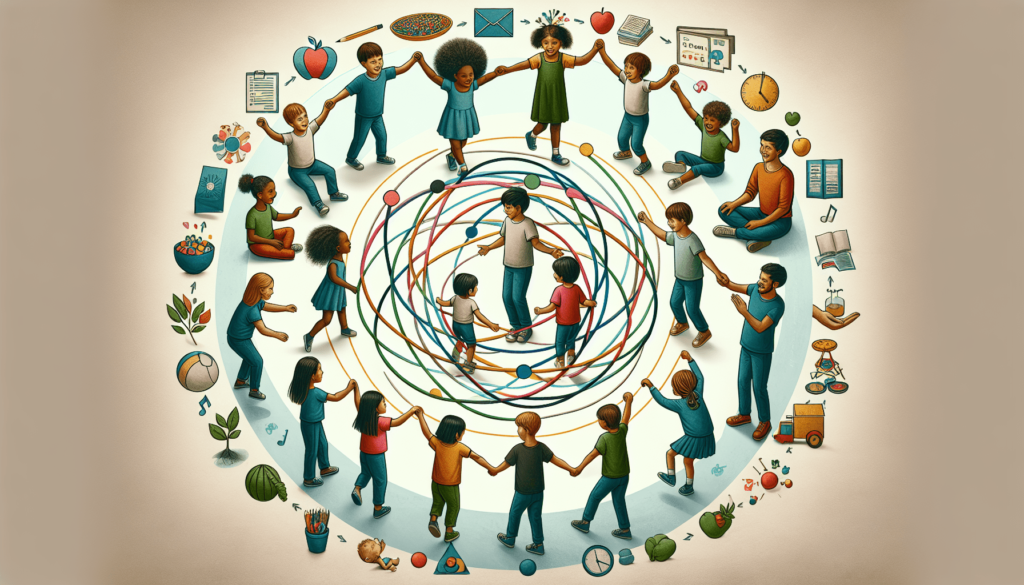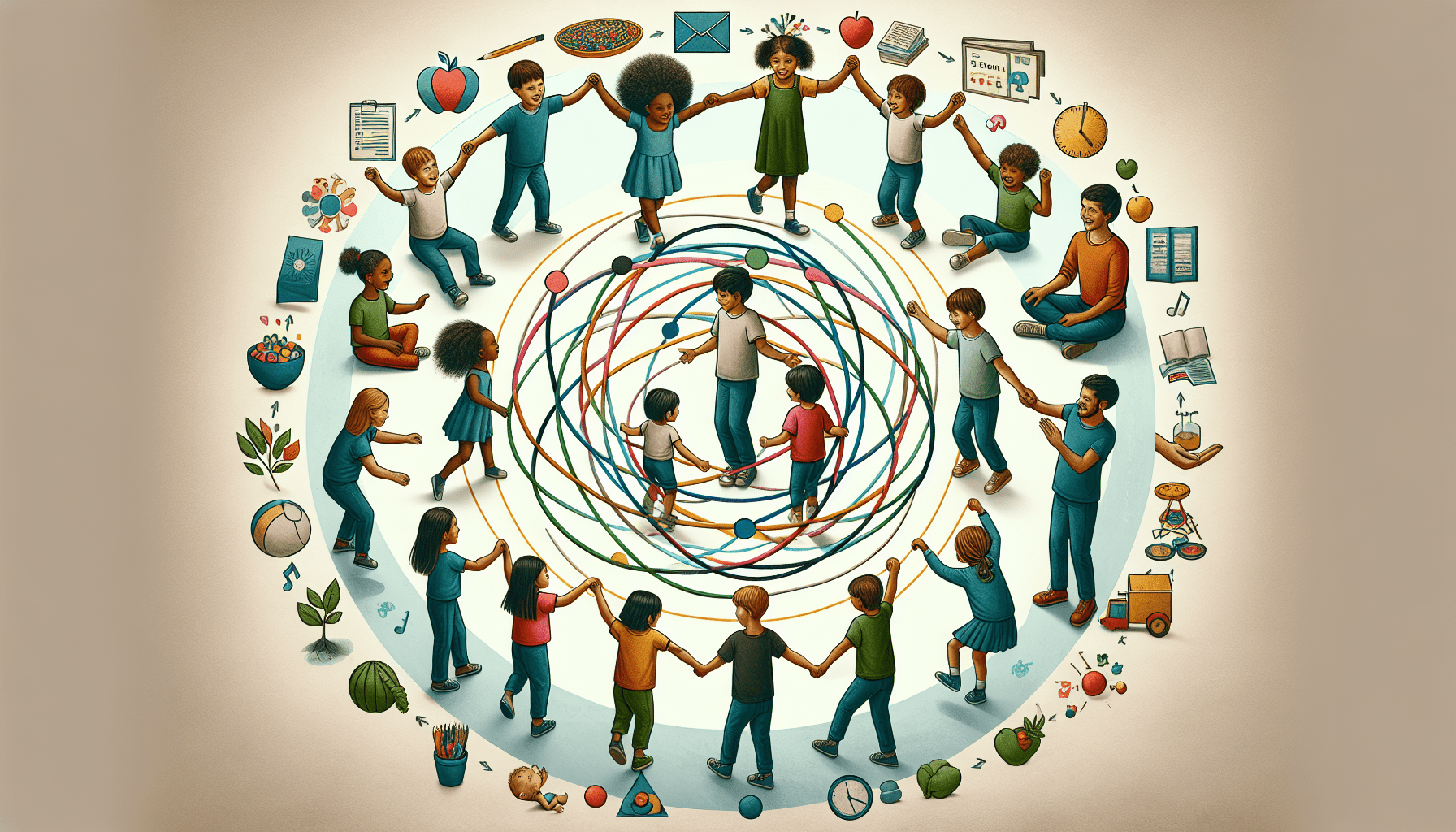In this article, you will explore the fascinating world of holistic approaches to childhood development. Discover how taking a holistic approach can benefit children by nurturing their physical, emotional, cognitive, and social well-being simultaneously. From the importance of play in promoting creativity and problem-solving skills to the power of mindfulness in enhancing emotional resilience, this article will provide valuable insights into the holistic methods that can help children thrive. So, join us on this exciting journey as we delve into the world of holistic approaches to childhood development.

Physical Development
Gross Motor Skills
Physical development in early childhood includes the development of gross motor skills, which involve the movement and coordination of large muscles in the body. These skills are crucial for activities such as standing, walking, running, and jumping. As children grow and develop, they become more proficient in using their bodies, practicing and refining their gross motor skills. Engaging in active play, sports, and outdoor activities can help develop and strengthen these skills.
Fine Motor Skills
Fine motor skills involve the use and coordination of smaller muscles, such as those in the hands and fingers. These skills are important for tasks such as writing, drawing, buttoning clothes, and using utensils. Developing fine motor skills enables children to gain more control and precision in their movements. Activities like coloring, stringing beads, and using building blocks can help improve children’s fine motor skills.
Health and Nutrition
Proper nutrition and overall health are vital for the holistic development of children. Providing them with a balanced diet rich in nutrients supports their physical growth, cognitive development, and emotional well-being. Encouraging healthy eating habits from an early age and exposing children to a variety of nutritious foods can set the foundation for a lifetime of good health. Regular physical activity, sufficient sleep, and regular check-ups with healthcare professionals also contribute to their overall well-being.
Cognitive Development
Language and Communication
Language and communication skills are fundamental for social interaction and cognitive development. From a young age, children begin to acquire language skills through listening, speaking, and eventually reading and writing. Engaging in conversations, storytelling, and reading books with children can foster their language development. It is important to provide opportunities for children to express themselves verbally and to actively listen and engage in meaningful conversations with them.
Problem Solving and Critical Thinking
Problem solving and critical thinking skills enable children to analyze, evaluate, and find solutions to various challenges they encounter. These skills promote creativity, logical reasoning, and the ability to think independently. Encouraging children to solve puzzles, play strategy games, and engage in open-ended activities fosters their problem-solving and critical thinking abilities. Providing a safe and supportive environment that allows children to explore and learn from their mistakes is essential in developing these skills.
Memory and Information Processing
Memory and information processing are crucial aspects of cognitive development. Children develop their memory skills by remembering and recalling information from their daily experiences. Memory aids such as rhymes, mnemonics, and visual cues can be helpful in enhancing memory retention. Additionally, exposing children to a variety of stimuli, such as learning new vocabulary, exploring different textures, and engaging in hands-on activities, can stimulate their brains and improve their information processing abilities.
Emotional Development
Self-Awareness and Emotional Regulation
Emotional development involves understanding and managing one’s own emotions. Developing self-awareness allows children to recognize and express their feelings appropriately. Through experiences and guidance, children learn to identify and cope with a range of emotions, such as happiness, sadness, anger, and frustration. Encouraging open communication, teaching mindfulness techniques, and providing a supportive environment can help children develop self-awareness and emotional regulation skills.
Empathy and Social Skills
Empathy and social skills play a critical role in establishing healthy relationships and interacting effectively with others. Teaching children to understand and appreciate the feelings and perspectives of others promotes empathy. Engaging in cooperative play, group activities, and storytelling about different cultures and experiences can cultivate empathy and social skills. Encouraging positive communication, sharing, and taking turns fosters the development of strong relationships and effective social interaction.
Resilience and Coping Mechanisms
Resilience refers to the ability to bounce back from adversity and adapt to challenging situations. Building resilience in children involves teaching them coping mechanisms to handle stress, frustration, and disappointment. Encouraging problem-solving, positive self-talk, and providing emotional support during difficult times can help children develop resilience. Additionally, offering opportunities for children to engage in activities that promote self-expression, such as art, writing, or outdoor play, can serve as healthy outlets for emotional release and promote resilience.
Social Development
Play and Peer Interaction
Play is a crucial aspect of social development in children. Through play, children learn to interact with their peers, negotiate, share, and develop important social skills. Engaging in cooperative play, pretend play, and group activities allows children to learn how to collaborate, communicate, and resolve conflicts. Encouraging unstructured playtime and providing toys and materials that promote imaginative play can stimulate social development and foster strong peer relationships.
Family and Community Relationships
Family and community relationships greatly influence a child’s social development. Strong and secure attachments with family members provide a foundation for healthy relationships and positive social interactions. Building a supportive and nurturing family environment allows children to feel valued, loved, and emotionally secure. Involving children in community activities and exposing them to diverse cultures and experiences allows them to develop a sense of belonging and empathy towards others.
Cultural Competence and Diversity
Cultural competence involves valuing and respecting diverse cultures, beliefs, and traditions. It enables children to develop an appreciation for cultural differences and fosters inclusivity. Teaching children about different cultures through storytelling, celebrations, and learning activities promotes cultural competence. Encouraging dialogue and discussions about diversity helps children develop a broader perspective and equips them with the skills needed to navigate an increasingly diverse world.

Creative Development
Artistic Expression
Artistic expression allows children to explore their creativity, emotions, and imagination. Engaging in activities such as drawing, painting, and sculpting provides an outlet for self-expression and allows children to communicate their thoughts and feelings visually. Providing various art materials and encouraging experimentation and exploration nurtures creative development in children.
Imagination and Pretend Play
Imagination and pretend play play a significant role in a child’s cognitive and social development. Through imaginative play, children create scenarios, take on different roles, and explore various perspectives. This type of play enhances problem-solving skills, encourages creative thinking, and promotes language development. Providing props, costumes, and open-ended toys encourages children to engage in imaginative play and further develops their creative abilities.
Music and Movement
Music and movement activities contribute to the holistic development of children. They enhance physical coordination, develop listening skills, and promote emotional expression. Engaging children in music and movement activities, such as dancing, singing, and playing musical instruments, fosters their creativity, self-confidence, and self-discipline. Listening to different genres of music, exploring rhythms, and participating in group music sessions can be highly beneficial for their overall development.
Sensory Development
Sensory Processing and Integration
Sensory processing and integration refer to the ability to process and respond to sensory stimuli from the environment. Developing strong sensory processing skills allows children to make sense of the world around them. Providing sensory-rich experiences, such as playing with different textures and exploring sensory materials, helps children develop sensory integration abilities. Engaging in activities that stimulate various senses, such as taste, touch, smell, sight, and sound, enhances their sensory development.
Exploration and Sensory Play
Exploration and sensory play provide children with opportunities to investigate their surroundings and engage their senses. Through sensory play, children can experiment with different materials, textures, and objects, stimulating their curiosity and enhancing their sensory development. Providing sensory bins, sand and water play, and nature exploration experiences allows children to engage in hands-on, sensory-rich activities that promote their cognitive and physical development.
Sensory Environments
Creating sensory environments is important for supporting sensory development in children. These environments are designed to stimulate the senses and provide a variety of sensory experiences. Incorporating elements such as different colors, textures, sounds, and scents in the environment can promote sensory exploration and enhance children’s sensory processing abilities. Sensory environments can be created both indoors and outdoors, allowing children to engage with their surroundings and develop their sensory skills.
Intellectual Development
Early Literacy and Numeracy
Early literacy and numeracy skills form the foundation for future academic success. Developing early literacy skills involves exposing children to books, storytelling, and engaging in activities that promote phonemic awareness, vocabulary building, and reading comprehension. Numeracy skills can be developed through activities that introduce concepts of number recognition, counting, and basic mathematical operations. Creating a language-rich environment and providing age-appropriate books and educational materials support intellectual development in young children.
Curiosity and Exploration
Curiosity and exploration are innate qualities in children that drive their intellectual development. Encouraging children to ask questions, investigate their interests, and explore the world around them fosters their natural curiosity. Providing opportunities for hands-on learning, nature exploration, and presenting open-ended problems stimulates their intellectual growth. Nurturing their inquisitive nature and allowing them to explore their own ideas and solutions helps develop critical thinking skills and a thirst for knowledge.
Independent Learning
Promoting independent learning skills prepares children for a lifetime of learning. Encouraging autonomy, self-discipline, and self-motivation fosters the development of independent learners. Creating an environment that supports independent exploration, providing resources for self-study, and allowing children to make choices and decisions about their learning empowers them to take responsibility for their education. Providing guidance, feedback, and opportunities for reflection enhances their ability to learn independently and develops their intellectual capacities.
Spiritual Development
Values and Identity
Spiritual development encompasses the exploration of values, ethics, beliefs, and identity. Helping children develop a sense of self and understanding their own values cultivates their spiritual development. Encouraging open conversations about different belief systems, cultures, and values promotes tolerance, empathy, and respect for diversity. Supporting children in exploring and reflecting on their own beliefs and values helps shape their spiritual identity.
Mindfulness and Reflection
Practicing mindfulness and reflection fosters emotional well-being and spiritual growth in children. Teaching mindfulness techniques, such as deep breathing exercises, focusing on the present moment, and cultivating gratitude, helps children develop self-awareness and cope with stress. Engaging in reflective activities, such as journaling, guided meditation, and discussion circles, promotes introspection and encourages children to connect with their inner selves, enhancing their spiritual development.
Connection to Nature and Spirituality
Encouraging a connection to nature and fostering an appreciation for the natural world can contribute to a child’s spiritual development. Providing opportunities for outdoor exploration, nature walks, and hands-on experiences with plants and animals allows children to develop a sense of wonder and awe. Engaging in activities that promote environmental stewardship and respect for nature, such as gardening or participating in conservation efforts, can deepen their connection to the natural world and nurture their spiritual development.
Environmental Development
Sustainability and Eco-consciousness
Promoting sustainability and eco-consciousness helps children develop a sense of responsibility towards the environment. Teaching them about the importance of conserving resources, reducing waste, and making eco-friendly choices fosters environmental development. Engaging in activities that promote recycling, upcycling, and gardening can create a sense of environmental stewardship and empower children to make environmentally conscious decisions.
Outdoor Education and Nature-based Learning
Outdoor education and nature-based learning encourage children to explore and connect with the natural world. Spending time outdoors allows children to engage their senses, develop physical skills, and gain a deeper understanding of the environment. Incorporating nature-based learning activities, such as nature walks, outdoor experiments, and studying local flora and fauna, enhances children’s environmental awareness and fosters a sense of wonder and respect for nature.
Environmental Responsibility
Teaching children about environmental responsibility involves instilling the importance of taking care of the environment and understanding the impact of human actions. Educating them about climate change, pollution, and the importance of sustainable practices promotes their environmental development. Encouraging children to participate in eco-friendly initiatives, such as energy conservation, waste reduction, and environmental clean-up activities, empowers them to take an active role in preserving the planet for future generations.
Parental Involvement
Parent-Child Bonding
Parental involvement and nurturing the parent-child bond greatly contribute to a child’s overall development. Building strong and secure attachments with parents or caregivers provides a foundation of love, trust, and emotional support. Engaging in activities that promote bonding, such as reading together, family outings, and quality one-on-one time, strengthens the parent-child relationship and helps children feel valued and secure.
Positive Parenting Techniques
Positive parenting techniques create a nurturing and supportive environment that fosters a child’s holistic development. Using positive reinforcement, setting clear boundaries, and practicing effective communication establishes a healthy parent-child relationship. Encouraging independence, providing age-appropriate responsibilities, and offering guidance rather than punishment promote positive behavior and self-confidence in children.
Supportive and Engaged Parenting
Being actively involved in a child’s education and well-being is essential for their holistic development. Supporting their interests, attending parent-teacher meetings, and engaging in open communication with educators allows parents to stay informed and contribute to their child’s educational journey. Becoming familiar with resources and activities that promote holistic development and providing opportunities for children to learn and explore both within and outside the home further contributes to supportive and engaged parenting.

